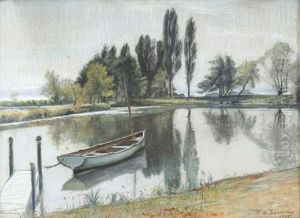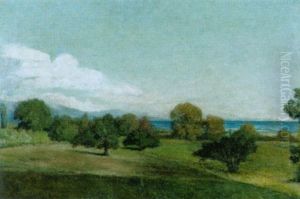Horace De Saussure Paintings
Horace-Bénédict de Saussure was not an artist in the traditional sense of painters or sculptors, but rather a Swiss geologist, meteorologist, physicist, and Alpine explorer. Born on February 17, 1740, in Conches, near Geneva, Switzerland, he came from a distinguished family and was deeply involved in the scientific community from a young age. He is often remembered for his extensive work on the natural sciences and his significant contributions to our understanding of the Earth and its atmosphere.
Educated in his hometown, de Saussure's early interests lay in the structure and formation of the Earth. He embarked on numerous expeditions to the Alps, which fueled his fascination with mountainous landscapes and the processes that shaped them. A man of enlightenment, he was keen on empirical observation and laid the groundwork for modern scientific tourism, encouraging others to explore and document the natural world.
His most famous accomplishment was the development of the cyanometer, a tool used to measure the blueness of the sky. He also improved the design of the hygrometer, an instrument to measure humidity. De Saussure's contributions to our understanding of atmospheric phenomena were groundbreaking. He was particularly interested in the relationship between the atmosphere and the temperature of the Earth, and he conducted pioneering work on solar radiation and its effects on climate.
In addition to his scientific pursuits, de Saussure also made significant contributions to the early development of mountaineering. In 1787, he completed the first ascent of Mont Blanc, the highest peak in the Alps, which had been a long-standing goal of his since his first unsuccessful attempt in 1785. This achievement cemented his reputation as a pioneering explorer and elevated the status of mountaineering as a scientific and recreational activity.
Throughout his life, de Saussure was a prolific writer and published numerous works on his findings. His extensive travels and observations also led to the publication of 'Voyages dans les Alpes', which not only provided a comprehensive study of the Alps but also served as an inspiration for later generations of scientists and explorers.
Horace-Bénédict de Saussure passed away on January 22, 1799, in Geneva. His legacy lives on through the many scientific principles and instruments he developed, as well as his influence on the fields of meteorology, geology, and the environmental sciences. His work laid the foundation for many of the methodologies used in modern scientific exploration and greatly expanded human knowledge of the natural world.




